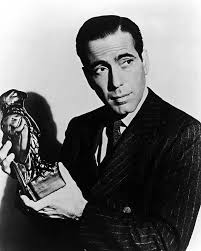
Word of the Day: MacGuffin
Today’s word of the day, courtesy of Word Genius, is MacGuffin. A MacGuffin, according to Word Genius, is “1 An object or event that serves as a plot device in fiction, but is ultimately irrelevant” or “2 A storytelling technique that serves to further the plot.” The term dates back less than 100 years, and Alfred Hitchcock is generally given credit for it. Michael Kurland, in a post for The Writer’s Toolbox, says that Hitchcock told a story that goes like this:
Two men were riding on a train in Scotland. One turned to the other and said, “What’s in that black box on the luggage rack?”
“A MacGuffin,” the other replied.
“What does it do?”
“It catches lions on the Scottish highlands.”
“But there are no lions on the Scottish highlands,” the man protested.
“Oh? Then that’s no MacGuffin.”
That was as close as Hitchcock ever came to explaining where the term MacGuffin came from; as far as anyone can tell, he made it up. He used it to describe the linchpin of the mystery, detective, or suspense story; the motivating or primal force behind the narrative. Not the motive itself, but the gizmo, situation, or event that lies behind the motive. (https://www.writingclasses.com/toolbox/articles/what-is-a-mcguffin)
But the explanation goes a bit beyond that. A MacGuffin is something that, ultimately, isn’t even all that important except as the thing the characters are chasing. It has no value in and of itself. An example of a MacGuffin is the Maltese Falcon in the novel by Raymond Chandler and the movie based upon the novel. The Holy Grail in many movies, including Monty Python and the Holy Grail, is a MacGuffin. Some people complained about the unsatisfying nature of the MacGuffin in Indiana Jones and the Kingdom of the Crystal Skull.
On this date in 1973, Richard Nixon announced that our country had reached an accord with the government of North Vietnam to end what was at the time the longest war in US history and bring “peace with honor.” The cease fire was to give the US two months to get our troops out of the country.
If you’re young, you weren’t around in the 60s and 70s, the Vietnam War was just a bit controversial. As an American war, it began in the early 60s, when John F. Kennedy was president. Actually, war in Vietnam preceded even that. The country was a French colony before World War II, and once that war ended, Vietnamese rebels began a campaign to end French rule. That war ended with the division of Vietnam into North and South, with the communists under Ho Chi Minh ruling the North, and the nationalists of Ngo Dinh Diem ruling the South. President Dwight Eisenhower pledged to support the Diem regime because of the US commitment to fighting communism. Of course, if the US had supported the rebels against the French colonialists, Ho may not have fallen into the communist camp.
In 1964, the USS Maddox was cruising in the Gulf of Tonkin off the coast of Vietnam. It was being monitored by some North Vietnamese boats. The Maddox shot three warning shots over the Vietnamese boats, and the Vietnamese responded by firing on the Maddox and its task force. A battle ensued.
President Lyndon Johnson used the Gulf of Tonkin incident to increase American military involvement in Vietnam, and the result was over 55,000 Americans dead and many more wounded, physically and psychologically, in a war we had no business being involved in. The incident was used by the Johnson administration to convince the voters that Vietnam was a threat to the United States, that if South Vietnam fell to the communists, then soon other countries like Thailand would fall to the communists, and we would be at risk. It wasn’t the truth.
Then again, our government frequently gives us a reason that we need to become involved in military conflicts overseas. The war in Afghanistan has since passed Vietnam as the longest war in American history, and it looks as if that war will end the same way Vietnam ended, with a departure of US troops and the installation of a government that we oppose, in this case the Taliban.
It’s almost as if the Gulf of Tonkin incident, or weapons of mass destruction, or the harboring of bin Laden are just MacGuffins, just plot devices to get the US military involved in wars of intervention. Like the Maltese Falcon, these reasons are not really important to our national security, just excuses to go to war. Then again, we shouldn’t be surprised when people in positions of power lie to use in order to advance the narrative they want to advance. And that applies to not just presidents but to people in all kinds of positions of power, even if the position is just that of a college president or provost.
The picture is “From The Haunted Studios Maltese Falcon Collection™ – High Resolution photograph of Humphrey Bogart holding Falcon” (https://www.hauntedstudios.com/Humphrey_Bogart_with_Maltese_Falcon_in_hand).